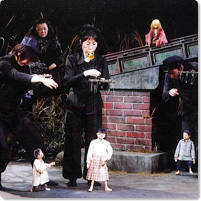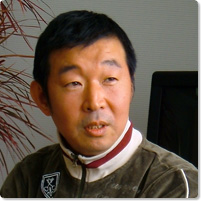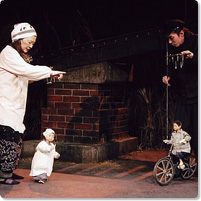
Data
:
Premiere: 2007
Length: 1 hr. 30 min.
Acts, scenes: One act, 10 scenes
Cast: 12 (6 men, 6 women)
Photo by Jun Ishikawa
Dolls Town

Born in 1957 in Himeji city, Hyogo Prefecture, Chong is a writer and director. Quitting the Literature Dept. of Doshisha Univ., he studied in the Art Dept. of the Yokohama School of Broadcasting and Cinema (present Japan Academy of Moving Images). After working as an art assistant at the Shochiku film studios, he joined the Black Tent Theater company.
The Shinjuku Ryozanpaku Theater company was created together with members of his own generation. Today he is active as a freelance writer and director. While writing plays for Bungakuza, Opera Theater Konyakuza and other theaters, he founded the production group “Umi no Circus” in 1992 and served as writer and director, presenting sadly comical plays about the subtleties of life. In 1993, he won the 38th Kishida Drama Award for The Terayama. He also became active as a film scriptwriter, winning the Asahi Film Contest Screenplay Award and the Kinema Junpo Film Award for the screenplay Tsuki wa Docchi ni Deteiru along with other awards. In 1998, he won numerous awards for Ai wo Kou Hito, including the main prize of the Kinema Junpo Film Awards, the Japan Academy Award for Best Screenplay, the 1st Kikushima Ryuzo Award and the Asia Pacific Film Festival Best Screenplay Award. He enjoys popularity writing scripts for TV and radio, having won the Grand Prize of the 2001 Geijutsu Festival for Boku wa Ashita 18 ni Naru (2001/NHK television). In 2008 his play Yakiniku Dragon was produced by the New National Theatre, Tokyo as a joint Japan-South Korea production, presented again in 2011 and 2016, and was also restaged in Seoul, ROK in 2008 and 2011. This play won him the 16th Yomiuri Theater Grand Prix award for Best Director, the 12th Tsuruya Namboku Drama Award, the 43rd Kinokuniya Theater Award and the 59th Geijutsu Sensho Minister of Education, Culture, Sports, Science and Technology Award. In spring of 2014 he was awarded Japan’s Medal of Honor with Purple Ribbon.
https://www.lespros.co.jp/artists/wishing-chong/


Data
:
Premiere: 2007
Length: 1 hr. 30 min.
Acts, scenes: One act, 10 scenes
Cast: 12 (6 men, 6 women)
Photo by Jun Ishikawa
There are two puppeteers named Okame and Hyottoko. They are traveling performers who earn their living by performing from town to town, but in fact they are penniless. If they don’t hurry on to the next town they will starve to death. Hyottoko is worried, but Okame is carefree, perhaps because she is a bit retarded. Exhausted, the two lean against a bridge and take out their “Kota” marionette and begin to play with it.
Long ago, in the year the War ended, in a place in Western Japan.
There was a small town by a river. Poor people lived in poor houses. Looking down on them from the bridge, it looked like a dolls town that might be blown away if a strong wind blew.
The boy Kota lived there. His father had died in the War and in his home lived his mother and a boarder named Kawashima. Kawashima was from an outcast village and worked as a leather tanner. He had a bad leg and didn’t speak much, but he was kind to Kota. He would even lend Kota his bicycle. But Kota didn’t like the fact that his mother seemed to like Kawashima.
While dreaming that when the War ended he would be free to leave this place, Kota spent his days playing with his half-breed friend Mariko and the sister and brother Ume and Mitsuru who lived nearby. They loved to make up stories that mixed rumor and tall tales, lies and quarrels in a half real, half-fantasy world and set off on adventures through it.
As time passes the War grows more serious. His mother, Fusayo, and Kawashima are called to join in training, and his favorite playmate, Mariko, is hidden away in a storehouse by her grandfather because he fears for her safety as a child with foreign blood. Ume and Mitsuru are sent off to the country against their will with the other children to protect them from the air raids.
Then the terrible air raids begin. Kawashima is killed by an incendiary bomb while working late one night making some leather sandals for Fusayo. People in the town are killed or burned out of their houses and the river is full of bodies.
Kota and Fusayo have managed to flee to the bridge, but everything around them is in flames. Fusayo gives the leather sandals Kawashima had made her to Kota. She tells him to swim to the island in the middle of the river downstream and pushes him off the bridge. She can’t swim so she tells him to go on without her. Even as the flames swirl around her, Fusayo gathers the courage to smile as she waves to her son.
Having survived the raid, Kota learns that Mariko died, unable to escape from the storehouse she was locked in. Now he knows that all the people he loved are gone and he has to live on with memories of the joys and sorrows he has known.
Some years later, Kota is the puppeteer Hyottoko and is managing to live with his partner Okame. Now his role in life is to give happiness and smiles to others as he keeps in his own heart the smiles of his mother and the girl Mariko he liked so much.
Related Tags